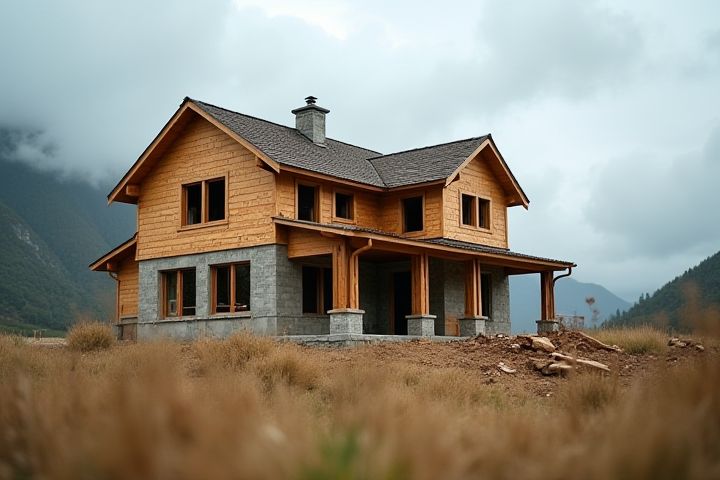
Building a house on land is subject to various factors, including zoning regulations, land-use restrictions, and environmental considerations. Before construction, it's crucial to check local zoning laws that dictate what can be built on specific parcels of land. Environmental assessments may be required to address issues like wetlands, soil stability, and protected habitats. Finding a licensed contractor familiar with local building codes ensures compliance and smooth construction. You should also consider utilities and access to essential services like electricity, water, and sewage for a functional home.
Can You Build A House On Any Land
Zoning laws
Zoning laws dictate how land can be used, determining whether you can build a house on a specific property. For example, residential zoned areas permit homes, while commercial or industrial zones may not allow residential construction. Each municipality has its zoning regulations, often outlined in a zoning map, specifying land use, density, and setbacks. Before purchasing land for a home, check the local zoning regulations to ensure compliance and avoid potential legal issues.
Building permits
Building permits are crucial for constructing a house on any land, as they ensure compliance with local zoning laws and safety regulations. Approximately 70% of municipalities require building permits, which help maintain community standards and manage land use effectively. Before you proceed with construction, it's essential to check specific permit requirements for your desired location; factors like land zoning, environmental impact, and property size can affect eligibility. Failure to obtain the necessary permits may result in fines or even demolition orders, highlighting the importance of this legal step in the home-building process.
Land surveys
A land survey is essential for determining if you can build a house on a specific piece of land, as it provides critical information about property boundaries, topography, and soil conditions. In the United States, the average cost of a land survey ranges from $300 to $900, depending on the complexity and size of the property. Knowing the zoning regulations is crucial; some areas may restrict building types or densities, ensuring you comply with local codes. Engaging a licensed surveyor not only clarifies these aspects but also safeguards your investment by identifying potential issues before construction begins.
Environmental regulations
Before building a house on any land, you must consider local environmental regulations that can significantly impact your project. These regulations often include zoning laws, which dictate land use, and environmental impact assessments, which evaluate potential ecological effects. For instance, wetlands, flood zones, or protected wildlife habitats might have restrictions that limit construction activities. Complying with these regulations not only ensures legal adherence but also promotes sustainable development and protects natural resources for future generations.
Access to utilities
Access to utilities is a crucial factor when considering land for house construction. Properties must have readily available connections to essential services such as water, electricity, gas, and sewage systems, with municipal infrastructure playing a significant role in this accessibility. For example, in urban areas, approximately 85% of residential lots are usually close to utility lines, while in rural settings, that percentage can drop dramatically, sometimes below 30%. Ensuring that your chosen land has these utilities is not only vital for immediate habitation but can also influence long-term property values and resale potential.
Easements and rights of way
Building a house on any land requires careful consideration of easements and rights of way, as these legal entitlements can significantly impact your property's usability. Easements grant others the right to use a portion of your land for specific purposes, such as access to utilities or nearby properties, while rights of way allow passage across your land. It's crucial to conduct a thorough title search and review land use regulations to identify any existing easements that may affect your building plans. Failure to comply with established easements could lead to legal disputes or financial liabilities, making it essential to understand these aspects before proceeding with construction.
Soil quality
Before building a house, assessing soil quality is crucial, as it influences stability and foundation types. Ideal soil for construction typically has a balance of sand, silt, and clay, characterized by a cohesion that can support building loads effectively. Poor soil conditions, such as expansive clay or loose sand, may require extensive site preparation or specialized foundation techniques, costing between $1,500 to $5,000 for necessary improvements. Ensuring your land has adequate drainage and bearing capacity, measured in pounds per square foot, is vital for long-term structural integrity and safety.
Flood zones
Building a house in flood zones poses significant challenges due to the heightened risk of water damage and safety hazards. Local zoning regulations often restrict construction in these areas to minimize potential loss of property and protect residents during flood events. Elevation requirements, flood-resistant materials, and engineered drainage solutions are crucial for compliance and safety. Before proceeding, thoroughly assess flood maps and consult local authorities to ensure your property is adequately prepared for flood risks.
Historic preservation restrictions
Building a house on any land may be restricted by historic preservation regulations. If the property is located in a designated historic district, you may encounter limitations on design, materials, and even landscaping to maintain the area's historical integrity. Compliance with local ordinances is crucial, as you could face fines or be required to alter your construction plans. Researching property-specific guidelines can ensure your project aligns with preservation standards and secures necessary permits.
Homeowner association rules
Homeowner Association (HOA) rules significantly impact your ability to build a house on a specific parcel of land. These regulations may include design guidelines, property use restrictions, and aesthetic standards that must be adhered to in order to maintain community uniformity. For instance, some HOAs require approval for house size, architectural style, and even exterior colors, while others might impose restrictions on landscaping and fencing. Before proceeding with construction, it is essential to review the HOA's bylaws and consult with their board to ensure compliance and avoid potential fines or legal issues.
